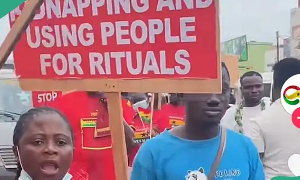A wave of street protests has erupted in parts of Ghana as demonstrators demand the expulsion of Nigerians accused of fuelling crime and endangering public safety.
In a video widely shared on Tuesday, large crowds carried placards bearing messages such as “Armed robbery and violent attacks must stop,” “Our health at stake due to mass prostitution,” and “Nigerians are kidnapping and using people for rituals.”
The demonstrators also displayed the photo of a man they claim was killed by a Nigerian in Accra.
A visibly angry woman, estimated to be in her mid-30s, was seen leading chants calling for Nigerians to leave.
“Nigerians must go because you can’t be in someone’s country and be doing anyhow. Nigerians must go,” she shouted into the camera. Another protester accused Nigerian traders, particularly those of Igbo origin, of dominating local markets and defying Ghanaian laws that restrict foreign participation in retail trade.
“These Igbo, they are in every part of the country and have targeted our markets. Not just Igbo, Nigerians are in almost every village, and our laws have not allowed foreigners to engage in real dealings.
They are perpetrating evil in our country. They even have an Igbo king in Ghana. They have hijacked our lands. It is just a matter of time; we will conquer them and take over our country,” he declared.
The protests have revived memories of historical tensions between both nations, most notably the 1983 “Ghana Must Go” episode.
Back then, Nigeria’s government under President Shehu Shagari ordered around two million undocumented immigrants—many of them Ghanaians—to leave the country immediately.
The move was justified at the time as a crackdown on illegal immigration, though critics viewed it as xenophobic. The event famously inspired the creation of the checkered plastic bag known today as the “Ghana Must Go” bag.
At the time, President Shagari defended the action, saying, “Illegal immigrants, under normal circumstances, should not be given any notice whatsoever.
If you break a law, then you have to pay for it.” Despite the growing tension, the Ghanaian government has yet to issue an official response or outline any measures to address the protesters’ demands.
It also remains unclear if there are plans to verify the allegations against Nigerians or to deport those found to be undocumented or involved in criminal activity.
Regional News of Tuesday, 29 July 2025
Source: www.legit.ng













